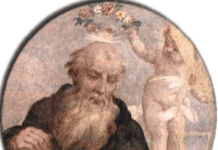As we celebrate the great feast of this eminent Father and Doctor of the Church, one thing comes straight into my heart and mind: Augustine was really a great wanderer of let God find Him and saved him
At first Augustine thought that he might find his deep longing of the heart in materialism. He himself boldly confessed in his Confessions: I lived in misery, like every man whose soul is tethered by the love of things that cannot last and then is agonized to lose them. Obviously such a search left him miserable since he could not find the joy he really was looking for in life.
Initially he tried to find what he was looking for in the Bible. Yet something impeded him from grasping the real meaning of God’s word. In his beautiful and extremely instructive catechesis on St Augustine, given in his general audience of Wednesday 9 January 2008, Pope Benedict XVI explained why Augustine was disappointed by reading the Bible.
However, since he was convinced that without Jesus the truth cannot be said effectively to have been found and since Jesus’ Name was not mentioned in this book, immediately after he read it he began to read Scripture, the Bible. But it disappointed him. This was not only because the Latin style of the translation of the Sacred Scriptures was inadequate but also because to him their content itself did not seem satisfying. In the scriptural narratives of wars and other human vicissitudes, he discovered neither the loftiness of philosophy nor the splendour of the search for the truth which is part of it.
Now, what was the solution he invented for himself to get to the truth? Leaving the Church with her bible and teachings and roaming around. Augustine thought that by going farther away from Jesus he could find what he was in dire need to encounter. As his life story powerfully suggests to us he easily fell into the net of an erroneous sect, the famous Manicheans. Pope Benedict XVI, a great Augustinian Pope, continues:
Yet he did not want to live without God and thus sought a religion which corresponded to his desire for the truth and also with his desire to draw close to Jesus. Thus, he fell into the net of the Manicheans, who presented themselves as Christians and promised a totally rational religion. They said that the world was divided into two principles: good and evil. And in this way the whole complexity of human history can be explained. Their dualistic morals also pleased St Augustine, because it included a very high morality for the elect: and those like him who adhered to it could live a life better suited to the situation of the time, especially for a young man. He therefore became a Manichean, convinced at that time that he had found the synthesis between rationality and the search for the truth and love of Jesus Christ. Manicheanism also offered him a concrete advantage in life: joining the Manicheans facilitated the prospects of a career. By belonging to that religion, which included so many influential figures, he was able to continue his relationship with a woman and to advance in his career. By this woman he had a son, Adeodatus, who was very dear to him and very intelligent, who was later to be present during the preparation for Baptism near Lake Como, taking part in those “Dialogues” which St Augustine has passed down to us. The boy unfortunately died prematurely. Having been a grammar teacher since his twenties in the city of his birth, he soon returned to Carthage, where he became a brilliant and famous teacher of rhetoric.
Was Augustine really happy in his heart at this apparent success in his life? Pope Benedict gives us the reply: However, with time Augustine began to distance himself from the faith of the Manicheans. They disappointed him precisely from the intellectual viewpoint since they proved incapable of dispelling his doubts. He moved to Rome and then to Milan, where the imperial court resided at that time and where he obtained a prestigious post through the good offices and recommendations of the Prefect of Rome, Symmacus, a pagan hostile to St Ambrose, Bishop of Milan.
When faith is accompanied by the fascinating God-given talent of reason, only then does it bear abundant good fruit. Such was the case in Augustine’s story. God’s grace had it that he would go and listen to Bishop Ambrose’s preaching. Ambrose’s rhetoric and, most of all, the content of his preaching moved Augustine’s heart. Pope Benedict tells us:
In Milan, Augustine acquired the habit of listening – at first for the purpose of enriching his rhetorical baggage – to the eloquent preaching of Bishop Ambrose, who had been a representative of the Emperor for Northern Italy. The African rhetorician was fascinated by the words of the great Milanese Prelate; and not only by his rhetoric. It was above all the content that increasingly touched Augustine’s heart. The great difficulty with the Old Testament, because of its lack of rhetorical beauty and lofty philosophy was resolved in St Ambrose’s preaching through his typological interpretation of the Old Testament: Augustine realized that the whole of the Old Testament was a journey toward Jesus Christ. Thus, he found the key to understanding the beauty and even the philosophical depth of the Old Testament and grasped the whole unity of the mystery of Christ in history, as well as the synthesis between philosophy, rationality and faith in the Logos, in Christ, the Eternal Word who was made flesh. Augustine soon realized that the allegorical interpretation of Scripture and the Neo-Platonic philosophy practised by the Bishop of Milan enabled him to solve the intellectual difficulties which, when he was younger during his first approach to the biblical texts, had seemed insurmountable to him. Thus, Augustine followed his reading of the philosophers’ writings by reading Scripture anew, especially the Pauline Letters.
In his Confessions Augustine recounts the moment of his conversion: Now when deep reflection had drawn up out of the secret depths of my soul all my misery and had heaped it up before the sight of my heart, there arose a mighty storm, accompanied by a mighty rain of tears. That I might give way fully to my tears and lamentations, I stole away from Alypius, for it seemed to me that solitude was more appropriate for the business of weeping. I went far enough away that I could feel that even his presence was no restraint upon me. This was the way I felt at the time, and he realized it. I suppose I had said something before I started up and he noticed that the sound of my voice was choked with weeping. And so he stayed alone, where we had been sitting together, greatly astonished. I flung myself down under a fig tree–how I know not–and gave free course to my tears. The streams of my eyes gushed out an acceptable sacrifice to thee. And, not indeed in these words, but to this effect, I cried to thee: “And thou, O Lord, how long? How long, O Lord? Wilt thou be angry forever? Oh, remember not against us our former iniquities.” For I felt that I was still enthralled by them. I sent up these sorrowful cries: “How long, how long? Tomorrow and tomorrow? Why not now? Why not this very hour make an end to my uncleanness?”
I was saying these things and weeping in the most bitter contrition of my heart, when suddenly I heard the voice of a boy or a girl I know not which–coming from the neighboring house, chanting over and over again, “Pick it up, read it; pick it up, read it.” Immediately I ceased weeping and began most earnestly to think whether it was usual for children in some kind of game to sing such a song, but I could not remember ever having heard the like. So, damming the torrent of my tears, I got to my feet, for I could not but think that this was a divine command to open the Bible and read the first passage I should light upon. For I had heard how Anthony, accidentally coming into church while the gospel was being read, received the admonition as if what was read had been addressed to him: “Go and sell what you have and give it to the poor, and you shall have treasure in heaven; and come and follow me.” By such an oracle he was forthwith converted to thee.
So I quickly returned to the bench where Alypius was sitting, for there I had put down the apostle’s book when I had left there. I snatched it up, opened it, and in silence read the paragraph on which my eyes first fell: “Not in rioting and drunkenness, not in chambering and wantonness, not in strife and envying, but put on the Lord Jesus Christ, and make no provision for the flesh to fulfill the lusts thereof.” I wanted to read no further, nor did I need to. For instantly, as the sentence ended, there was infused in my heart something like the light of full certainty and all the gloom of doubt vanished away.
Closing the book, then, and putting my finger or something else for a mark I began–now with a tranquil countenance–to tell it all to Alypius. And he in turn disclosed to me what had been going on in himself, of which I knew nothing. He asked to see what I had read. I showed him, and he looked on even further than I had read. I had not known what followed. But indeed it was this, “Him that is weak in the faith, receive.” This he applied to himself, and told me so. By these words of warning he was strengthened, and by exercising his good resolution and purpose–all very much in keeping with his character, in which, in these respects, he was always far different from and better than I–he joined me in full commitment without any restless hesitation.
Augustine’s examination of conscience and his deep repentance from what he did fully opened him for God’s surprising grace. In that state of vulnerability Augustine was wise enough to hold on to God’s Word as found in St Paul’s letter to the Romans and let God change him from thereon.
How much are we opening the Bible and let it talk to us the way it magnificently did to Augustine?
In our search for God let us make our own the following poetic prayer to the Holy Spirit of our great companion and faith guide Augustine of Hippo (354-430):
Breathe in me, O Holy Spirit, That my thoughts may all be holy. Act in me, O Holy Spirit, That my work, too, may be holy. Draw my heart, O Holy Spirit, That I love but what is holy. Strengthen me, O Holy Spirit, To defend all that is holy. Guard me, then, O Holy Spirit, That I always may be holy.











